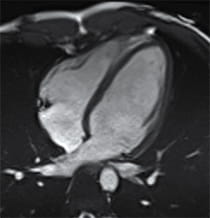On this page
What Is Left Ventricular Non-Compaction Cardiomyopathy (LVNC)?
In LVNC, muscle in the heart's left ventricle — one of two lower chambers — becomes sponge-like, with extra space between the muscle tissues. These heart muscle changes can affect how the left chamber pumps blood and can allow blood clots to form in the chamber.
What causes left ventricular non-compaction cardiomyopathy?
In some people, the cause of LVNC is from changes in specific genes (mutations). These gene changes can affect how the heart forms and can lead to left ventricular non-compaction cardiomyopathy.
These gene changes can be inherited from parent to child. Therefore, it is important to determine if the cause of your LVNC is secondary to gene changes.
What are LVNC risk factors and complications?
LVNC can cause complications, including:
Back to top
What Are The Signs And Symptoms Of LVNC?
If you have LVNC, you might not have any symptoms at all or even know you have the disease.
Talk to your doctor if you have symptoms such as:
- Fluttery heartbeats, or palpitations.
- Chest pain.
- Trouble breathing or shortness of breath.
- Fatigue (extreme tiredness), especially when you work out.
- Dizziness, fainting, or light-headedness.
- Swelling in your legs or feet.
- Blood clots.
Let your doctor know if you have family members who've had sudden cardiac arrest, heart failure, or a heart attack.
Back to top
How Do You Diagnose LVNC?
At UPMC, you'll see a heart doctor and genetic counselor. They'll screen you for LVNC and ask about your family history of heart disease.
Tests for LVNC include:
- MRI — which lets doctors see your heart and how blood flows.
- EKG — which checks the heart's electrical activity and shows how your heart is beating.
- Echocardiogram — an ultrasound that creates an image of your heart.
- Heart rhythm monitoring — with a Holter monitor.
- Genetic tests — to determine if your LVNC is inherited.
Back to top
How Do You Treat LVNC?
Your care team at UPMC will create a tailored plan to treat your LVNC. Your treatment will depend on your symptoms.
Treatment goals include managing any symptoms and reducing your risk of complications.
Lifestyle changes
To help manage LVNC symptoms and improve your overall health, your doctor might suggest:
- Being more active.
- Eating healthy foods.
- Managing high blood pressure.
- Quitting smoking and other tobacco use.
Medicine to treat LVNC
Your doctor might prescribe certain drugs to treat LVNC.
These include:
- Blood thinners to reduce the risk of blood clots.
- Beta blockers to help control heart beats and lower blood pressure.
- Water pills to reduce blood pressure.
- ACE inhibitors to control an enzyme that can make blood pressure higher.
Surgery to treat LVNC
If needed, your doctor might talk to you about:
By UPMC Editorial Staff. Last reviewed on 2024-10-01.


















